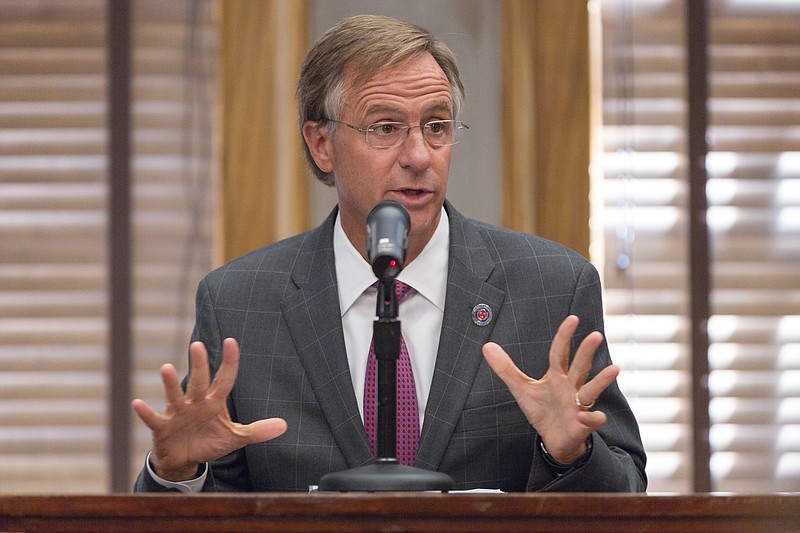Read more
Gov. Haslam cool to using state budget surpluses to eliminate Hall tax
Gov. Bill Haslam may have learned something about the prospect of raising the state gas tax from his Insure Tennessee campaign, but he also may have opened himself to accusations of being the proverbial boy who cried wolf over the issue.
Last week, only days after he ended a statewide tour to highlight the need for added revenue for state roads in 2016 (and hinting that money could come from increasing the gas tax), he opened the door to delaying a more permanent solution until 2017.
"I mean, nobody wants to have a gas tax," Haslam said. "If [legislators] want to say, hey, it's an election year, let's put it off, we can do that."
The nasty fight last winter over Insure Tennessee may have been on his mind. After the governor worked diligently for several years to craft a state-centric solution to accepting federal funds for health care for those who previously couldn't get it, he saw his lofty proposal dashed before it ever made it to the floor of the state Senate or House.
He should have made his case better, legislators said. He should have anticipated his opposition, proponents said. He didn't really back it once it fell into disfavor, Democrats said.
Thus, given a dire warning last winter by Transportation Commissioner John Schroer that the state would soon face spending only on road maintenance rather than new projects, Haslam didn't immediately propose a gas tax, insist a tax was needed before the end of the 2015 session or tell legislators it was a take-it or leave-it plan.
Instead, he sounded the alarm, rationally discussed highway funding realities and potential solutions, and scheduled a tour to make his case around the state.
"You are paying on cents per gallon and that is going down," Haslam said late last spring. "But the cost of concrete, asphalt and engineering work has gone up, not down. We can't kid ourselves into thinking that we can keep doing that and things will be fine."
"We have a long-term, multi-year, multi-billion dollar problem," he said in July.
By the time Haslam's tour began, though, opposition to a gas tax had coalesced in the legislature and with organizations such as Americans for Prosperity-Tennessee.
So, even while he earnestly told groups about the needs - $6 billion in the state and $423 million for seven projects in Hamilton County alone - he also sounded a bit defensive.
"Everybody talks about the needs they have, but then there's a 'I'm not really excited about a gas tax, what else can we do?'" Haslam said. "The reality is, there's not a magic bullet out there."
At one of his final stops, it was apparent gas tax opponents had made inroads.
"Let me be real clear," Haslam said. "We haven't proposed anything yet, so everybody who's saying they're for something or against something, we don't have a proposal out there yet. The point I'm making is, we can't keep going like we are now. It's real simple. Vehicles get about twice as good mileage now as they did the last time we addressed this 26 years ago. Yet maintaining and paving roads costs three times as much. Well, that doesn't work forever."
Then last week, with House Speaker Beth Harwell, House Majority Leader Gerald McCormick, Senate Majority Leader Mark Norris and Senate Transportation Chairman Jim Tracy in opposition, he seemed willing to put off any solution.
And although Haslam said the delay in a funding solution would push the backlog of highway projects further out, the matter didn't appear to have the same urgency it did last winter.
That may be because of the state's $300 million budget surplus.
Indeed, after saying in July that a "one-time fix, a one-time spot of money really doesn't solve our issue," the governor last week wouldn't rule out an incremental approach to highway funding in the upcoming legislature and then come back with a more permanent solution in 2017.
Such an approach, he suggested, might include restoring some of the $280 million in gas tax money that was rerouted for general funds during the terms of former Govs. Phil Bredesen and Don Sundquist.
So, highway funding may, in fact, be found for the next year or two, but as Haslam has said, it will be necessary for something to be done before he leaves office in January 2019.
"There's a lot of voices that say let's push this off," he said. "But the need is not going to go away."
The governor deserves credit for being willing to deal with the reality of the situation, even with the possibility of a gas tax, but he will need the buy-in of the legislature to make it happen. That way, whatever is proposed, and whenever it is proposed, it will not end up in the same trash heap as Insure Tennessee.
